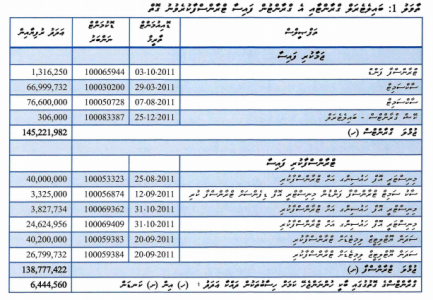Jumhooree Party (JP) leader Gasim Ibrahim “will have to withdraw” his candidacy for speaker of the 18th People’s Majlis, due to be sworn in on Wednesday (May 28), President Abdulla Yameen has said.
Speaking to reporters this morning prior to his departure to India to attend the swearing-in ceremony of Prime Minister-designate Narendra Modi, Yameen said that “a lot of discussion” has taken place with the JP leader on the issue of the speakership.
“The party has informed Gasim twice in writing of our position as well as what could happen as a result of [Gasim contesting for speaker]. However, Gasim has not accepted it yet,” Yameen said.
The “fraternity” of the Progressive Coalition – made up of the ruling Progressive Party of Maldives (PPM), JP and Maldives Development Alliance (MDA) – could be adversely affected if the business tycoon sought the speaker’s post, Yameen warned.
The “common practice” across the world was for the speaker of parliament to belong to the party with the most number of seats, he contended.
“So other parties in the coalition putting forward names is not commonly done,” he said.
While Gasim has not responded to the PPM’s last letter, Yameen said the ruling party was still open for talks with the coalition partner.
“But I don’t know what else we could do for Gasim. Gasim will just have to withdraw his name the way I see it. There isn’t anything more we could do for Gasim at this point,” he added.
Internal strife
In the wake of the president’s remarks today, JP Secretary General Ahmed Sameer told local media that the party’s council will hold a meeting to decide its stance.
The next speaker will be elected through secret ballot at the first sitting of the 18th People’s Majlis on Wednesday.
Yameen meanwhile revealed that the PPM’s parliamentary group had decided yesterday to nominate MPs-elect Abdulla Maseeh Mohamed for speaker and Abdul Raheem Abdulla for deputy speaker following consultation with former President Maumoon Abdul Gayoom.
Asked about PPM MP Ahmed Nazim’s bid for the speaker’s post, Yameen said the outgoing deputy speaker was free to contest independently of the party, but expressed confidence that “a person as responsible as Nazim” would not do so.
Tourism Minister Ahmed Adeeb – deputy leader of the PPM – has meanwhile claimed that allegations of corruption that surfaced in the press last week were linked to his refusal to support certain individuals for the speaker’s post.
Adeeb claimed that MP Nazim was behind the corruption allegations, which are currently under investigation by both the Anti-Corruption Commission and auditor general’s office.
Adeeb said he could not back Nazim as he was suspected of “blackmail” and “corruption” and declared his support for Maseeh.
“This problem [corruption allegations] has come up because my stand is strong inside the PPM. I am accused of these things because I take the stand that is most beneficial to the country. And because I have influence within PPM,” he was quoted as saying by newspaper Haveeru.
Zero-sum game
Maseeh, Raheem, and Nazim were re-elected in the March 22 parliamentary polls, which saw the Progressive Coalition secure a combined total of 53 out of 85 seats.
However, neither party won enough seats to reach the 43-vote simple majority on its own.
Following the signing of three out of the five independent candidates elected to the 18th parliament, the PPM currently has 37 seats, followed by the opposition Maldivian Democratic Party (MDP) with 25 seats, the JP with 15 seats, the MDA with five seats, and the religious conservative Adhaalath Party with one seat.
MDP MP-elect for the Thimarafushi constituency, Mohamed Musthafa, also signed for the ruling party a week after the parliamentary polls.
While the PPM and MDA together have 42 seats, PPM MPs-elect Ahmed Mahloof and Ahmed Nihan revealed after the parliamentary elections that the pair had pledged their support for Gasim’s bid to become speaker during negotiations for forming the Progressive Coalition ahead of last year’s presidential election runoff.
However, PPM Leader Gayoom told local media this week that Gasim was not promised the speaker’s post as part of the coalition agreement between the parties.
Meanwhile, former President Mohamed Nasheed – acting president of the MDP – signalled the opposition party’s support for Gasim following a meeting at the business tycoon’s residence last month.
The MDP announced last Friday (May 23) that the party’s 25 MPs-elect would back a candidate who support’s the parties policies, including judicial reform, empowerment of local councils as well as the introduction of a progressive income tax and a minimum wage.
